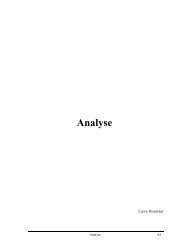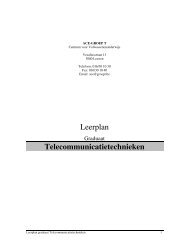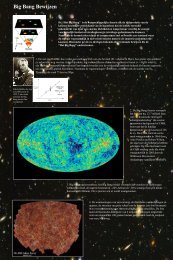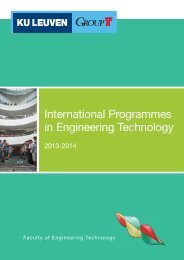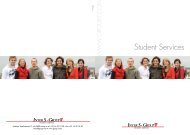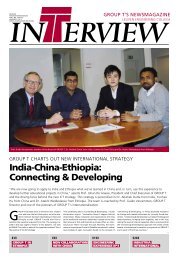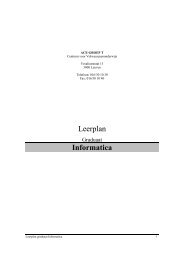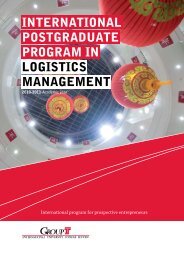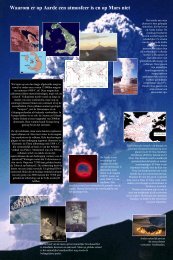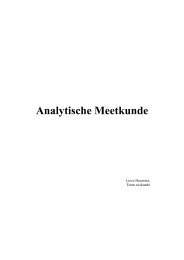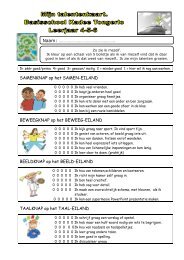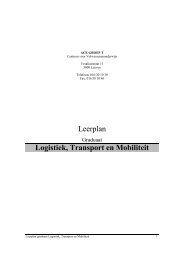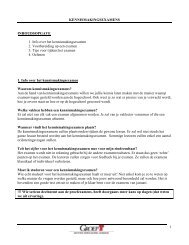Engineering: Connecting Cosmos & Consciousness - Groep T
Engineering: Connecting Cosmos & Consciousness - Groep T
Engineering: Connecting Cosmos & Consciousness - Groep T
Create successful ePaper yourself
Turn your PDF publications into a flip-book with our unique Google optimized e-Paper software.
‘educating’. “Education is not the same as educating.<br />
Education is the theory of learning and teaching.<br />
Educating is about people: learning to know, to do,<br />
to live together and to be. What does that mean,<br />
developing people? Well, it all has to do with educing<br />
the essence. To bring to development all that<br />
is in you, what was given you through your genes.<br />
Becoming who you already are as an engineer.”<br />
Evolving environment<br />
Again according to Prof. De Graeve, <strong>Engineering</strong> is<br />
also related to energizing the emptiness. “Emptiness<br />
is not synonymous to vacuum. Emptiness means<br />
that everything does not have an inherent existence.<br />
Something only exists when it is interconnected with<br />
all other things. An engineer must be aware of the<br />
fact that all things in life are connected with each<br />
other. This is Buddhism, Eastern philosophy and it<br />
touches the essence of Chinese thinking.”<br />
Enterprising is, still according to Prof. De Graeve,<br />
experiencing existence. “In all that you do, you experience<br />
existence. And this existence is experienced<br />
in an environment. Environmenting – the fourth E –<br />
deals with embracing the evolving environment. And<br />
what is the ultimate environment? That’s the cosmos.<br />
We are one with the cosmos.”<br />
The fifth E is ensembling. “Of course that is not the<br />
same as assembling,” explains Prof. De Graeve. “Naturally,<br />
engineers love to assemble, but ensembling<br />
goes beyond that. It is about ‘enconsciousizing oneness’,<br />
in other words, it is about the growing awareness<br />
of oneness, of everything being connected to<br />
everything. Enconsciousizing oneness means that<br />
engineers, by making things, become increasingly<br />
aware that all is one. That also cosmos and consciousness<br />
are one. If young people discover that they are<br />
one with the cosmos and consciousness as an engineer,<br />
the engineering profession will immediately<br />
become much more appealing to them.”<br />
CDIO and backbone<br />
According to Prof. De Graeve, the CDIO principles<br />
fit fully within with the 5E model, especially in engineering.<br />
“CDIO is the minimum, the backbone you<br />
need in engineering. But an engineer also must be<br />
enterprising, have a mission. When you are enterprising,<br />
you are embracing the environment. When you<br />
are educating, you have to educe the essence. And<br />
when you see the oneness, you are ensembling. But<br />
the ultimate ensembling is the counsciousness. And<br />
the ultimate environment is the cosmos. CDIO is in<br />
fact cosmos and consciousness.”<br />
Beyond textbooks<br />
After his speech, Prof. De Graeve gave the floor to<br />
five students of the Beijing Jiaotong International<br />
Class who had started this academic year. The International<br />
Class is the result of years of collaborative<br />
work between GROUP T and the Beijing Jiaotong<br />
University. The five students testified to their experiences<br />
with the CDIO principles and the 5E model<br />
from which their curriculum was conceived.<br />
“CDIO is in fact cosmos<br />
and consciousness.”<br />
Zha Lichen emphasized that the International Class is<br />
not a copy of the existing Chinese engineering program<br />
but distinguishes itself in a number of ways.<br />
“We step beyond textbooks. We visit companies and<br />
learn from experience during the <strong>Engineering</strong> Experiences.<br />
We love this style of study.”<br />
Li Luxi spoke of the importance of teamwork. “In<br />
high school everything was about competition. In the<br />
International Class, cooperation is key. Team stands<br />
for Together Each Achieves More. It’s no longer<br />
‘I made it’. It’s ‘We made it’.”<br />
Hero and engineer<br />
Tan Qin recalled an old Chinese proverb: ‘Environment<br />
creates talents.’ She believes that the important<br />
steps in this process include knowing, adapting, making<br />
use of and creating. An old story by Kuang Hong<br />
illustrates this. “Kuang Hong’s family was so poor<br />
that he had to start working for a rich land owner.<br />
He couldn’t go to school but asked his boss for permission<br />
to read books from his library in exchange<br />
for work. This is how Kuang Hong educated himself<br />
and became a famous scholar.”<br />
Li Jun quoted a classic from Western literature: Robinson<br />
Crusoe. A hero and an engineer. On his secluded<br />
island, he managed to organize himself such that he<br />
was able to provide for his needs for years. “He first<br />
conceives life on that island, then designs the essential<br />
needs, implements these ideals and operates to<br />
survive,” relates Li Jun.<br />
Ying Jinbing spoke about ‘Life is an <strong>Engineering</strong><br />
Experience’ and took himself as an example. “I grew<br />
up as an only child and had nobody to play with at<br />
home. I dreamed of having a friend and resolved to<br />
build myself a robot friend later. In primary school,<br />
I made paper kites and systematically took apart<br />
electrical devices to see how they worked. As a teenager,<br />
I built entire constructions using LEGO, at first<br />
by following the instructions, later by using my own<br />
imagination. In high school I developed a fascination<br />
with Chinese painting and how it’s possible to create<br />
an entire world with a few dots and lines. When<br />
I chose the International Class, all these memories<br />
came back to me. Imitating, discovering, creating,<br />
designing. Engineers are not only educated at colleges.<br />
Our whole life is a continuation of <strong>Engineering</strong><br />
Experiences.”<br />
Y.P.<br />
GROUP T - LEUVEN ENGINEERING COLLEGE<br />
2<br />
Prof. Dr. Johan De Graeve, President and Chief Executive of GROUP T and Prof. Dr. Ning Bin, President of Beijing<br />
Jiaotong University with students from the International Class: Tan Qin, Ji Luxi, Zha Lichen, Ying Jinling and L Jun.<br />
jg. 20, nr. 3, 16 augustus 2011<br />
03183_INGENIEURS_Interview_3_20.indd 2 11/07/11 17:01



